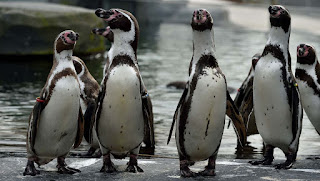A COLLABORATION FOR THE PRESERVATION OF PENGUINS
Since last summer, the Paris Zoological Park has been
participating in a scientific project on Humboldt penguins , in partnership
with the Hubert Curien Pluridisciplinary Institute (IPHC) of the CNRS and the
University of Strasbourg, and the Polar Department of the Scientific Center of
Monaco.
This multidisciplinary project makes it possible to refine the techniques
and perfect the procedures before going to apply them in the natural
environment, in Antarctica, with the constant concern to develop new study
methods making it possible to reduce or even eliminate any disturbance on the
animals due to the study itself . Beyond this help, which allows to
significantly shorten the development phases before going to apply them in
extreme environments, it also turns out that studying our penguins makes it
possible to answer certain targeted questions for which it is impossible to
respond in a natural environment (lack of history on individuals,
disappearances during studies, etc.)
A ROBOT AMONG PENGUINS
As already done in the natural environment by CNRS research teams,
the approach of animals by a rolling robot makes it possible to have a reduced
impact on the behavior of the colony .
At the Zoological Park, the project started its second study phase
in January with the work of a Master 2 student for a period of 6 months, who
will take care of this rolling robot “Rover”, but not only.
If this new step will allow the robot to try out different
appearances in order to find the one that will allow you to go unnoticed within
the colony , it will also be accompanied by other technological innovations, in
particular for remote cardiac monitoring. animals without having to capture or
stress them.
In addition, an automatic weighing platform will be set up. It
will make it possible to obtain, record and transmit the weights of the
penguins which will pass voluntarily over them. This information will provide
the animal team with precise and constant monitoring of a very good health
indicator, the weight of individuals, thanks to this autonomous system.
The animals will be identified automatically by two means: their
chip and a camera linked to visual recognition software . Developed by the
Scientific Center of Monaco, this technology, which uses powerful artificial
intelligence algorithms, will thus be at the service of the health of our
animals, while it will allow in Antarctica to better understand variations in
weight over time. the life cycle of these extreme birds. Our visitors will be
able to see this technology at work… and modestly keep the weight of our
penguins to themselves!
Follow ZooNews Digest on Facebook Go to https://www.facebook.com/zoonewsdigest
